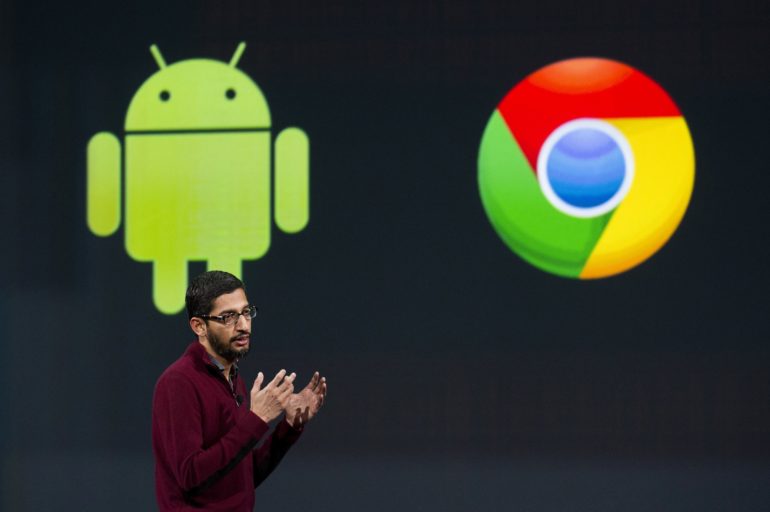Sundar Pichai, senior vice president of Android, Chrome and Apps for Google Inc., speaks during the Google I/O Annual Developers Conference in San Francisco, California, U.S., on Wednesday, June 25, 2014.
David Paul Morris | Bloomberg | Getty Images
LONDON — Google is still engaged in anti-competitive practices in the mobile search market, according to its smaller competitors, who claim a record antitrust fine from the European Union has done little to reduce the tech giant’s dominance.
The company announced late Monday the results of a quarterly auction to decide the winners of its so-called “choice screen,” which lets Android users in Europe pick their default search engine when setting up their smartphone. The process was introduced last year to appease EU antitrust regulators following their 4.3 billion euro ($5 billion) fine on Google over unfair practices related to its mobile operating system.
Search engines have to bid to be included among four options — including Google — that consumers choose from during setup. Smaller search engines object to having to pay Google for the right to be considered.
Google’s latest auction results show that Microsoft was the main winner across most major European markets, with its Bing search engine securing a spot in the U.K., Germany, France and 10 other countries. Privacy-focused search engine DuckDuckGo, which has previously found success with the bidding process, this time features in just four markets — Bulgaria, Croatia, Iceland and Liechtenstein.
“Despite DuckDuckGo being robustly profitable since 2014, we have been priced out of this auction because we choose to not maximize our profits by exploiting our users,” the company wrote in a blog post.
“In practical terms, this means our commitment to privacy and a cleaner search experience translates into less money per search. This means we must bid less relative to other, profit-maximizing companies.”
“The current remedy is not a remedy at all — it is fundamentally rigged by Google to benefit Google. The Commission has said they have been waiting on data to act: such data is now available. To expedite this process, we are sending the Commission our data that demonstrates exactly how the current process inevitably eliminates DuckDuckGo.”
Germany’s Ecosia, a search engine that invests its profits into planting trees, also lost out in the auction. It won a spot in just one small market, Slovenia. Google commands an overwhelming majority of the mobile search market in Europe, with its Android system running on almost 75% of the world’s smartphones.
“We’ve long asserted that this pay-for-play model would force out purpose-driven businesses from the Android platform, and here is the proof of that,” said Ecosia CEO Christian Kroll. “Ecosia is the biggest Europe-based search engine, yet users can barely access us in Android via the auction screen.”
French alternative provider Qwant — which was also included in only one country, Luxembourg — told CNBC that, “through this auction process, Google continues to hinder access to the mobile search market.” It’s worth noting however that some lesser-known players, like PrivacyWall and info.com, did make the cut in the latest auction.
Google’s defense
Google maintains that the auction process “allows search providers to decide what value they place on appearing in the choice screen and to bid accordingly.” The company says it is designed to ensure that no search engine is prioritized over another and that the results are determined through competitive bidding.
“Android provides people with unprecedented choice in deciding which applications they install, use and set as default on their devices,” a Google spokesperson told CNBC. “In developing the choice screen for Europe, we carefully balanced providing users with yet more choice while ensuring that we can continue to invest in developing and maintaining the open-source Android platform for the long-term.”
A European Commission spokesperson told CNBC: “We have been discussing the choice screen mechanism with Google, following relevant feedback from the market, in particular in relation to the presentation and mechanics of the choice screen and to the selection mechanism of rival search providers.”
“The Commission is committed to a full and effective implementation of the decision,” the spokesperson added. “We will continue monitoring closely the implementation of the choice screen mechanism.”
Margrethe Vestager, the bloc’s top antitrust official, has made a name for herself by trying to rein in Google and other internet giants when it comes to anti-competitive practices. She suffered a major loss earlier this year when the EU’s general court ruled the Commission failed to prove that the Irish government gave an unfair tax advantage to Apple. The EU has since appealed that ruling.
Google has so far been hit with three antitrust fines from the EU amounting to more than $9 billion, and is contesting each one through court appeals. The other two fines focus on the company’s shopping comparison service and advertising. A fourth case is said to target the company’s jobs search tool.
News of Google’s latest Android auction — the company’s third so far — favoring Microsoft over smaller players comes as the U.S. Department of Justice readies a lawsuit against the firm following its antitrust investigation into allegations that Google favors its own businesses, such as YouTube, in search results.



